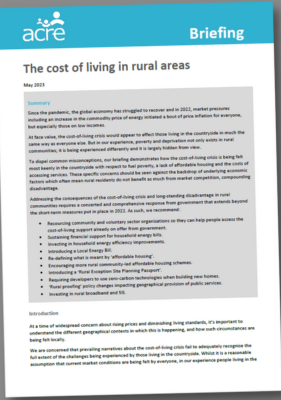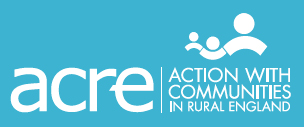Rural households are being disproportionately impacted by the cost-of-living crisis
3 May 2023
Action with Communities in Rural England (ACRE) cites the combined impact of rising fuel prices, cost of housing and access to services as factors making life especially difficult for people living in the countryside.
In a briefing considering how the rural characteristics of the cost-of-living crisis published today, the charity claims deprivation in the countryside is often overlooked by policy makers who fail to recognise the profoundly limiting circumstances in which many low-income households find themselves.
It is estimated that 27% of rural households are currently in fuel poverty, many of whom are off the gas grid and have not received the same level of government subsidy as those on dual tariffs.
Housing affordability has also got worse in rural areas since the pandemic. Between 2020 and 2021, it was estimated rental prices in suburban and rural areas jumped by 11% compared to just 2% in urban areas. And in 2022, the cheapest properties to buy were 8.8 times the earnings of those on lower incomes, compared with 7.6 times earnings in the city.
Perhaps the most distinctive challenge facing rural households is access to services. Given that rural residents often need to travel more frequently and further to access employment and services, they have also been disproportionately affected by rising fuel prices which increased from £1.16 per litre for petrol in 2020 to £1.65 in 2022, and £1.19 to £1.78 for diesel respectively.
The human consequences of the cost-of-living crisis in rural areas can already be seen.
- Citizen Advice reports that energy debt is now the most common problem that people are presenting with in rural areas.
- A recent academic study supported by a range of organisations including ACRE, found that 91% of frontline workers in rural areas have seen homelessness increase in their area over the past five years.
- Data published by the Trussell Trust shows that 65% more food parcels were distributed in rural districts in 2022/23 compared with 2020/21.
The briefing comes as the All-Party Parliamentary Group for Rural Business and the Rural Powerhouse chaired by Julian Sturdy MP and Lord Cameron of Dillington published its own report, ‘The Rural Premium’ based on written and oral evidence from stakeholders across the rural economy including ACRE. This report also details how those living and working in rural communities are at a disadvantage in terms of everyday living requirements, housing, employment and energy.
Commenting on the publication of ACRE’s briefing, Richard Quallington, Executive Director of the charity said: “Far too often the needs and concerns of rural communities escapes the lens of policy makers. This has certainly been the case over the past couple of years as the cost-of-living crisis has disproportionately ground down on many lower income rural households. Not only have sticky plaster initiatives such as the Energy Bills Support Scheme failed to recognise and address the specific circumstances of those living in the countryside, but long-term structural problems such as the lack affordable homes and access to services have gone neglected.
Whilst there is no magic bullet, we hope that at the very least the evidence we have published will trigger a much-needed conversation about what it means to be left behind in rural areas, and what can be done to achieve levelling up in the countryside”.
Notes to editors
Media contact: Phillip Vincent, p.vincent@acre.org.uk, 01285 425645.
ACRE’s Rural Cost of Living Briefing can be accessed here.
ACRE (Action with Communities in Rural England) is a charity speaking up for and supporting rural communities. It is the national body of the ACRE Network, England’s largest rural grouping of community support charities which together reach over 35,000 community groups annually, and lever in over £34 million each year in support of initiatives that equip people with the knowledge, skills, and connections needed to improve their local community.

“Whilst there is no magic bullet, we hope that at the very least the evidence we have published will trigger a much-needed conversation about what it means to be left behind in rural areas, and what can be done to achieve levelling up in the countryside”
Richard Quallington, ACRE’s Executive Director



